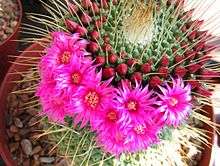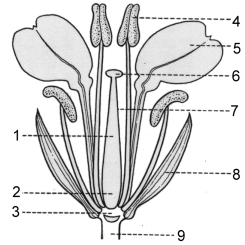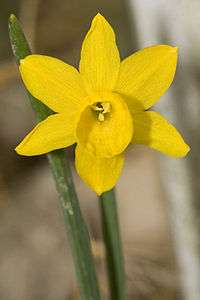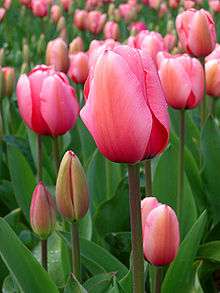Definify.com
Webster 1913 Edition
Flower
Flow′er
Is worth a hundred coats of arms.
Flow′er
Flow′er
,Webster 1828 Edition
Flower
FLOW'ER
,FLOW'ER
,FLOW'ER
,Definition 2026
flower
flower
English

| Picture dictionary |
|---|
Alternative forms
- flowre (obsolete)
Pronunciation
- (UK) IPA(key): /ˈflaʊ.ə/
- (US) IPA(key): /ˈflaʊ.ɚ/
- Rhymes: -aʊ.ə(r), -aʊə(r)
- Homophone: flour (for people who pronounce flower as one syllable, or flour as two)
Noun
flower (plural flowers)
- A colorful, conspicuous structure associated with angiosperms, frequently scented and attracting various insects, and which may or may not be used for sexual reproduction.
- 1597, De Campo, Don Richardo de Medico The Trimming of Thomas Nashe Gentleman
- How frail a flower thou doſt ſo highly a prize:/Beauty's the flower, but love the flower-pot/That muſt preſerve it, els it quickly dyes.
- 1597, De Campo, Don Richardo de Medico The Trimming of Thomas Nashe Gentleman
- (botany) A reproductive structure in angiosperms (flowering plants), often conspicuously colourful and typically including sepals, petals, and either or both stamens and/or a pistil.
- 1894, H. G. Wells, The Flowering of the Strange Orchid
- You know, Darwin studied their fertilisation, and showed that the whole structure of an ordinary orchid flower was contrived in order that moths might carry the pollen from plant to plant.
- 1894, H. G. Wells, The Flowering of the Strange Orchid
- A plant that bears flowers, especially a plant that is small and lacks wood.
- We transplanted the flowers to a larger pot.
- (usually with in) Of plants, a state of bearing blooms.
- The dogwoods are in flower this week.
- (euphemistic, hypocoristic) The ****, especially the labia majora.
- 1749, John Cleland, Fanny Hill: Memoirs of a Woman of Pleasure, Part 2
- that my virgin flower was yet uncrop'd, never enter'd into his head, and he would have thought it idling with time and words to have question'd me upon it
- 1749, John Cleland, Fanny Hill: Memoirs of a Woman of Pleasure, Part 2
- (idiomatic) The best examples or representatives of a group.
- We selected the flower of the applicants.
- Hooker
- The choice and flower of all things profitable the Psalms do more briefly contain.
- Southey
- the flower of the chivalry of all Spain
- The best state of things; the prime.
- She was in the flower of her life.
- Tennyson
- A simple maiden in her flower / Is worth a hundred coats of arms.
- (obsolete) Flour.
- Arbuthnot
- The flowers of grains, mixed with water, will make a sort of glue.
- Arbuthnot
- (in the plural, chemistry, obsolete) A substance in the form of a powder, especially when condensed from sublimation.
- the flowers of sulphur
- A figure of speech; an ornament of style.
- (printing) Ornamental type used chiefly for borders around pages, cards, etc.
- (Can we find and add a quotation of W. Savage to this entry?)
- (in the plural) Menstrual discharges.
- Bible, Leviticus xv. 24 (American King James Version)
- And if any man lie with her at all, and her flowers be on him, he shall be unclean seven days; and all the bed where on he lies shall be unclean.
- Bible, Leviticus xv. 24 (American King James Version)
Quotations
For usage examples of this term, see Citations:flower.
Usage notes
In its most common sense as "a colorful conspicuous structure", the word flower includes many structures which are not anatomically flowers in the botanical sense. Sunflowers and daisies, for example, are structurally clusters of many small flowers that together appear to be a single flower (a capitulum, a form of pseudanthium), but these are considered to be flowers in the general sense. Likewise, the botanical definition of flower includes many structures that would not be considered a flower by the average person, such as the catkins of a willow tree or the downy flowers found atop a cattail stalk.
Synonyms
- (inflorescence that resembles a flower): head, pseudanthium
- (best examples): cream
- (best state of things): prime
Translations
|
|
Verb
flower (third-person singular simple present flowers, present participle flowering, simple past and past participle flowered)
- (intransitive) To put forth blooms.
- This plant flowers in June.
- (intransitive) To reach a state of full development or achievement.
- Spenser
- when flowered my youthful spring
- 1940 Mahadev Desai, translator, Mahatma Gandhi, An Autobiography, Part III (IX) Simple Life, original published 1927-1929
- It only needed watering to take root, to flower and to fructify, and the watering came in due course.
- Spenser
- (intransitive) To froth; to ferment gently, as new beer.
- Francis Bacon
- That beer did flower a little.
- Francis Bacon
- (intransitive) To come off as flowers by sublimation.
- Milton
- observations which have flowered off
- Milton
Synonyms
Translations
|
|
Related terms
Derived terms
See also
- Appendix:Flowers
- Category:Flowers
Etymology 2
Pronunciation
Noun
flower (plural flowers)
- (rare) Something that flows, such as a river.
- 1886–1890, J. D. Rees, Narratives of Tours in India, page 340:
- Leaving the weavers’ village behind you, and crossing the sandy bed of the Vengavati or ‘Swift-flower,’ which, however, contained not a drop of water, you reach the ancient Jain temple.
- 1888, John T. White, The Seventh Book of Cæsar’s Gallic War with a Vocabulary, page 224:
- Rhŏdănus, i, m. The Rhodanus (now Rhone); a river of Gaul [prob. a northern word, meaning “Swift-flower or Swift-passer”].
- 1893, Arthur A. MacDonnell, A Sanskrit-English Dictionary, page 340:
- sará-yu, f. [swift flower: √sri] N. of a river (in Oudh), in C. gnly. û.
- 1959, Scottish Studies, volumes 3–4, page 92:
- one that flows with force and speed; the fast flower
- 1886–1890, J. D. Rees, Narratives of Tours in India, page 340:
Usage notes
- The term is used with this meaning almost exclusively in cryptic crossword clues where it means river.
Alternative forms
- flow-er





